|
|
|
Sort Order |
|
|
|
Items / Page
|
|
|
|
|
|
|
| Srl | Item |
| 1 |
ID:
120547
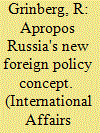

|
|
|
|
|
| Publication |
2013.
|
| Summary/Abstract |
THE FAST CHANGING international situation requires Russia's flexible and timely reaction to the new challenges and threats to its security that arise in the process of the constant evolution of the entire system of modern international relations. At the same time, the Russian Federation, too, is in the process of transformation; it is acquiring new possibilities for an effective response to these challenges and threats; the structure of its national security interests is changing, which should find its reflection in Russia's new foreign policy concept. It is therefore not surprising that among the first decrees V.V. Putin signed after his inauguration as the president of Russia is the decree "On Measures to Ensure the Realization of the Russian Federation's Foreign Policy Course" that instructed the RF Foreign Ministry to present a new draft of the RF foreign policy concept. This will be the country's fourth foreign policy concept since the disintegration of the USSR 21 years ago.
|
|
|
|
|
|
|
|
|
|
|
|
|
|
|
|
| 2 |
ID:
129532
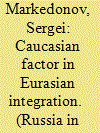

|
|
|
|
|
| Publication |
2014.
|
| Summary/Abstract |
Moscow has made the largest progress in Eurasian integration with Armenia. It has had no integration plans (given numerous constraints) with regard to Azerbaijan or Georgia. Yet Russia's victory cannot be regarded complete or unequivocal. Eurasian integration is one of Russia's key foreign policy priorities at present, viewed as an instrument to bolster its influence in the international arena. As President Vladimir Putin said, "We propose a model of a powerful, supranational union, capable of becoming one of the poles of the modern world and playing an effective role in linking Europe to the thriving Asia-Pacific region."
Prospects for a major reconfiguration of the post-Soviet space emerged after the Customs Union agreement became effective in July 2010. It was followed by three-and-half-years efforts by Russia and its closest partners Belarus and Kazakhstan to institutionalize the Eurasian integration project, which opened the possibility of other former Soviet republics joining the core "union of three
|
|
|
|
|
|
|
|
|
|
|
|
|
|
|
|
| 3 |
ID:
147757
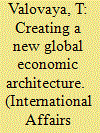

|
|
|
|
|
| Summary/Abstract |
FASTER REGIONAL ECONOMIC INTEGRATION is a characteristic feature of today's global economy. The successful creation of the European Union in the early 1990s encouraged both the development of already existing groupings and the emergence of new integration arrangements in different parts of the world: from Latin America and the Middle East to Southeast Asia. This trend accelerated significantly during the global economic crisis that began in 2008, when it became clear that regional integration provides additional opportunities for overcoming the crisis phenomena in the economy.
|
|
|
|
|
|
|
|
|
|
|
|
|
|
|
|
| 4 |
ID:
106163


|
|
|
| 5 |
ID:
140751
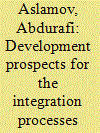

|
|
|
|
|
| Summary/Abstract |
This article examines the Republic of Tajikistan’s participation in regional integration among the Eurasian states. It analyzes the integration experience accumulated during the activity of the Eurasian Economic Community (EurAsEC) and the main obstacles hindering the integration within the framework of the EurAsEC. It focuses on the trends, problems, and prospects for Tajikistan’s possible accession to the Eurasian Economic Union (EEU).
|
|
|
|
|
|
|
|
|
|
|
|
|
|
|
|
| 6 |
ID:
134130
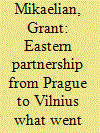

|
|
|
|
|
| Publication |
2014.
|
| Summary/Abstract |
On 28-29 November, 2013, Vilnius hosted the 3rd Eastern Partnership Summit, at which several former Soviet republics were expected to ascend to a higher institutional level in their relations with the European Union. Belarus and Azerbaijan preferred to step aside, while two other members (Armenia and Ukraine) left the program in the fall of 2013 when the talks were over. Georgia and Moldova initialed, but did not sign, the Association Agreement with the EU. This means that four-and-a-half years of this highly ambitious program produced very modest results, to say the least, very much due to the fact that Ukraine, the region's biggest player, excused itself from signing.This did not put a full-stop to the relations between the Eastern Partnership (EP) members and the EU, however the Vilnius Summit marked an intermediate finish of sorts. The old strategy ran into a dead end, leaving Brussels without a new strategy for its relations with its Eastern neighbors. To move forward, the EU should try to find out what went wrong. We should analyze what has happened and why. Here I have tried to comprehend how the relations between the EU and Soviet successor-states developed under the project to provide (probably delayed) answers to the following questions:
1. Did the summit fail because Russia was very skeptical about the results of European integration for its neighbors?
2. Why did this problem come to the fore in mid-2013 rather than in 2008 when it all started?
3. Why did the Russian factor (described as an imminent threat to the European programs on the post-Soviet space) remain neglected?
To correctly understand the motivation of what has been done and to avoid unsubstantiated assessments, we need to look at what happened in Vilnius from the perspective of Brussels, Moscow, and the post-Soviet capitals involved.
I will rely on the chronology of the EP project divided into three key periods:
-from May 2008 when the program was announced to May 2009 when it started;
|
|
|
|
|
|
|
|
|
|
|
|
|
|
|
|
| 7 |
ID:
134115
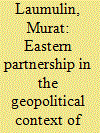

|
|
|
|
|
| Publication |
2014.
|
| Summary/Abstract |
The Eastern Partnership (EP) program should be viewed as another attempt to reformat the post-Soviet space along anti-Russian and anti-Eurasian lines and a response to Moscow's integration activities. This is not the first attempt of its kind: the West has already tried other geopolitical and geoeconomic tools. The final aim, however, has remained the same: Russia's domination and possible integration of post-Soviet regions irrespective of form, even economically adequate, should be prevented by all means.
|
|
|
|
|
|
|
|
|
|
|
|
|
|
|
|
| 8 |
ID:
184174
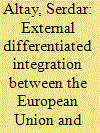

|
|
|
|
|
| Summary/Abstract |
The forthcoming Customs Union (CU) upgrade negotiations have the potential to stabilize and deepen the ties between the European Union (EU) and Turkey and bring them to a stronger form of external differentiated integration. This article examines the viability of an EU–Turkey Deep and Comprehensive Free Trade Agreement (DCFTA), similar to that between Ukraine and the EU, as an alternative to the CU. The paper contends that a DCFTA would benefit both the EU and Turkey while it would de facto shift the contractual relations from accession conditionality to market access conditionality with potential political repercussions.
|
|
|
|
|
|
|
|
|
|
|
|
|
|
|
|
| 9 |
ID:
172115


|
|
|
|
|
| Summary/Abstract |
The European Union (EU)-Turkey customs union (CU) has led to a significant level of integration between a non-member country and the EU and therefore represents an example of external differentiated integration. Turkey’s relations with the EU, until recently, have been largely motivated by its membership objective. However, Turkey’s membership prospects have recently been diminishing, due both to mutual estrangement because of Turkey’s ever-deteriorating performance on EU-mandated reforms and the current difficulties challenging European integration. Under these circumstances, concerns regarding structural problems and conjunctural challenges have forced both parties to revise the CU. This study aims to explain how the parties should revise it to tackle the challenges posed by current economic relations. It argues that building broader and deeper economic integration with a certain degree of collective policy-making capacity will be crucial for furthering relations, which may thereby contribute to Turkey’s accession process in a longer term.
|
|
|
|
|
|
|
|
|
|
|
|
|
|
|
|
| 10 |
ID:
130905


|
|
|
|
|
| Publication |
2014.
|
| Summary/Abstract |
THE INTEGRATION PROCESSES, which have passed to the stage of concrete implementation in the Customs Union format, are now, in a sense, an indicator of stability for the member countries' national and state identity. A policy of ethnic tolerance and social solidarity ensures domestic stability. Kazakhstan's citizens are members of more than 100 ethnic groups and 17 religious confessions. Building a political nation has become the basis for shaping national andstate identity in Kazakhstan. A strong economy, ethnic and religious harmony, and patriotism are to be a response to the challenges of modernity.
|
|
|
|
|
|
|
|
|
|
|
|
|
|
|
|
| 11 |
ID:
130906
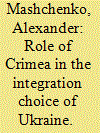

|
|
|
|
|
| Publication |
2014.
|
| Summary/Abstract |
I SHARE the greater part of apprehensions voiced here in connection with a possible signing of the Association Agreement between Ukraine and the EU. This will be a heavy blow to Ukrainian and Crimean economies. I want to draw your attention to the fact that without Crimea the situation in Ukraine could have been worse or even much worse. It is Crimea and its people who kept Ukraine within the Russian World and prevented the final rupture. In a way, the transfer of the peninsula to Ukraine was in the interests of Russia. Having sacrificed Taurida, it retained Ukraine in the field of its political and cultural attraction. I do hope that sociologists, political scientists, political technologists, and politicians will agree that the majority of the Crimean population would have voted for a membership in the Customs Union at a referendum on Ukraine's civilizational (integration) choice had it been organized. Let us hypothesize how would the deputies of the Supreme Rada of Ukraine who represent Crimea in this highest legislative structure vote at a referendum or in the Rada.
|
|
|
|
|
|
|
|
|
|
|
|
|
|
|
|
| 12 |
ID:
130907
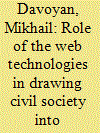

|
|
|
|
|
| Publication |
2014.
|
| Summary/Abstract |
In recent years, it has becomes vitally important to draw civil society into international relations. Indeed, deeper international integration is impossible without a direct involvement of the business community NGOs and public movements in the processes which will produce shared ideas about future integration an establish authentic operational feedback.
|
|
|
|
|
|
|
|
|
|
|
|
|
|
|
|
| 13 |
ID:
120548


|
|
|
|
|
| Publication |
2013.
|
| Summary/Abstract |
IN PRINCIPLE, I hail a new concept yet remain convinced that conceptual documents should, by definition, be related to the fundamental, strategic sides of our state's foreign policy activities for the simple reason that foreign policy is a prerogative of state even though there are such things as soft power, people's diplomacy and what not.
|
|
|
|
|
|
|
|
|
|
|
|
|
|
|
|
|
|
|
|
|